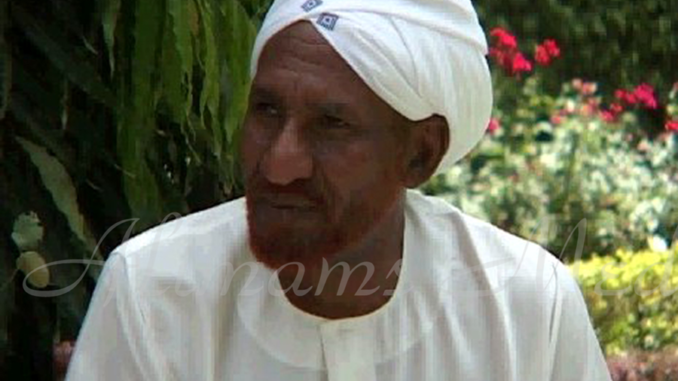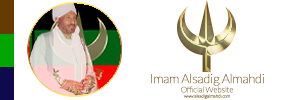
بسم الله الرحمن الرحيم
Statement By Imam Al sadig Al Mahdi On:
Religious Co-Existence in Sudan
(This statement is extracted from a lecture Imam Al-Sadig Al Mahdi presented at the Nubian Club entitled “The Social Upbringing of African Child”, on the African Child Day 16th June 2004.)
- Islam, whose beliefs and teachings are well defined and specific, recognizes Religious Plurality, and even Spiritual and Moral worthiness in ABRAHAMIC Religions: “Not all of them are alike: Of the People of the Book are a portion that is upright, who recite God’s revelations during the night, who bow down in worship * Who believe in God and the Last Day, who order what is right and forbid what is wrong, who are quick to do good deeds, these people are among the righteous * They will not be denied (the reward) for whatever good deeds they do: God knows exactly who is conscious of him” [1]
This tolerant attitude even extends to those who have sought Truth without the benefit of a revelation. In the period before Islam, some upright people have “deviated” from the prevalent polytheism; they were called the deviants (ALSABIEN). One such a monotheist was UMMAYA IBN ABY ALSALT. The Prophet (PBUH) even praised the Moral worthiness of a “virtue pact”: HILF ALFUDUL, which some of the polytheists of Mecca contracted to protect the down trodden and stand up to the usurper, he said about that pact: “I witnessed in the house of ABDULLAHI IBN JADAAN a pact, if I was invited to join in ISLAM, I would comply”. He also praised the well- known man of generosity HATIM AL-TAAY for his generous nature and said: My message is to complement Moral values. Those “human” seekers of Truth (i.e. by Human endeavor) are also recognized: )The “Muslim” believers, the Jews, The Christians, and the SABIANS (i.e. the seekers of Truth by their own means)- all those who believe in God and the Last Day and do good, will have their reward from their Lord. No fear for them nor will they grieve).[2]
Religious Plurality is regarded in Islam as a norm: (If thy Lord had so willed, He could have made mankind one People: but they will not cease to dispute).[3]
- There are Christians in Sudan, and a small number of Jews. They are People of the Book, we should deal with them in terms of mutual recognition, mutual respect, abiding by the said Quranic Teachings, and abiding by what the Prophet Mohammad (PBUH) said in this matter: “We the Messengers of God are like brothers, who have different mothers but the same faith”. (Narrated by: Al-Bukhari, Muslim, Abu-Daod & Imam Ahmed).
- Our attitude to the African traditional creeds in Sudan and the rest of Africa has been condemnatory in a way, which further fuels cultural denigration. They have provided moral cement for African societies, they have attempted to reconcile the occult with the Natural, to integrate society with the Natural environment, and to forge a continuous link between past, present and future generations. They have, therefore, been articulate in creating order and avoiding chaos. A Nigerian specialist in comparative Religion, Bolaji E. Idowu, maintained that African Religions believe in a One Supreme Being. Similar descriptions have been given by Evans Pritchard[4], and Lienhardt [5] on Nuer and Dinka religions respectively. Idowu said that, despite the multiplicity of African Traditional creeds, common factors can be traced, e.g. a common name referring to God is found in different places in West Africa: Namely, the Nigerian Kollung, Piya, Pero, Tagale & Waja call Him: Yamba, in Cameroon and Congo, He is called Yambe and Yembe“[6]. He said that, the different African creeds have the following common characteristics:
- Belief in a Supreme Being.
- Belief in lesser functional deities.
- Belief in the spiritual cogency of Ancestors.
- Magic and folk medicine.[7]
African Traditional creeds have further common Characteristics, namely: The ceremonial utility of music, song and dancing. This particular utility has been absorbed by SUFI ORDERS in Sudan, and by several African Christian Churches, for example, ALDORA Church in Nigeria. Such practices have been very effective in popular religious activity. The second common characteristic is the crucial Spiritual role of Natural Phenomena, a feature resembling Buddhism.
It is necessary to study these Religions and observe their positive moral, cultural, and social roles. This understanding is so necessary to create conditions for better understanding, and for eliminating cultural denigration, and for establishing a basis for toleration and co-existence.
- Nothing said here should deter Religious Preaching. It is necessary to abide strictly in this matter by: (Call People to the Way of your Lord, with wisdom and beautiful teaching. Argue with them in the most courteous way, for your Lord knows best who has strayed from His way and who is rightly guided)[8].
Such exchanges are inevitable, and are religiously sought after, but they should take place in the context of Religious Freedom for all, and Peaceful voluntary Religious Preaching. The Holy Quran clearly and strongly states that “there is to be no compulsion in religion”[9].
- It is imperative for all Religions in Sudan to abide by three conditions:
- To emphasize their Teachings, which uphold the Brotherhood of Man and respect the values of Truth, Wisdom and Tolerance.
- To uphold equal citizen Rights for all.
- To refrain from compulsion in Religion.
- Sudan has accepted Christianity in its Nubian Kingdoms voluntarily and peacefully in the 6th century of the Christian Era. Sudan has later converted to ISLAM through centuries voluntarily and peacefully in all but its Southern regions. Many Southern citizens later converted to the Western churches of Christianity. It is now necessary for all the peoples of Sudan to contract a Religious Protocol or Charter to regulate the issues of Religion and Politics, Religion and State, and Inter-religious affairs.
This charter seasoned as it should be by a rich Sudanese experience of both positive and negative lessons, would have a cardinal role in building the Nation, and would be instructive beyond the Sudan in Africa, the Arab World, and indeed internationally.
[1] Quran 3:113-115
[2] Quran 2:62
[3] Quran 11: 118
[4] Edward E. Evans-Pritchard Nuer Religion 1975, Oxford. Oxford UP
[5] Godfrey Lienhardt Divinity and Experience: The Religion of the Dinka
[6] Idowu, E. Bolaji, African Religion: A Definition , Maryknoll. Orbis Books, 1975.
[7] Idowu, op cit
[8] Quran 16:125
[9] Quran 2:256.

